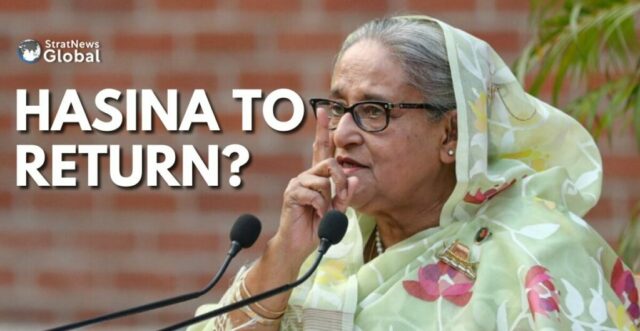Bangladesh has made an official request to India to send back former Prime Minister Sheikh Hasina who is in Delhi in a high-security area in a bungalow that acts as a safehouse.
The 77 year-old Awami League leader fled to India on August 5 after a student-led movement ousted her from power.
Local media reports quoted Touhid Hossain, Foreign Affairs Adviser of Bangladesh’s interim government as saying that they have made a request through a “note verbale” to the Indian government.
Sources in the Indian government have also confirmed that they have received today a note verbale from the Bangladesh High Commission, in connection with the extradition request.
Sources added, ” At this time, we have no comment to offer on this matter.”
The Bangladesh Prime Minister fled to India after she was ousted following weeks of protests and clashes that killed 753 people and injured thousands, according to the interim government.
The interim government led by Nobel Laureate Muhammad Yunus termed the killings as “crimes against humanity and genocide”.
Muhammad Yunus took charge three days after Hasina fled the country.
Last month, Yunus had announced that the government would seek Hasina’s extradition from India.
Addressing the nation on the 100th day in office, Yunus said that his administration would prosecute those accountable, including Hasina for the numerous casualties during the student protests that ended her 15-year rule.
“We will seek the return of the fallen autocrat Sheikh Hasina from India to hold her accountable. Efforts to prosecute those responsible are progressing well.”
Yunus added, “I have already discussed the issue with the Chief Prosecutor of the International Criminal Court, Karim Khan.”
He promised to ensure justice for every killing during the July-August revolution.
Under the exradition treaty, the Yunus-led caretaker government plans to bring Hasina back to Bangladesh to “to try her for mass killings during the student-led protest in July and August.”
Sheikh Hasina faces several cases, including 42 for murder.
Her extradition is governed by the extradition treaty signed between Bangladesh signed between India and Bangladesh in 2013 and amended three years later.
According to the treaty, extradition may be refused if the offence for which it is requested is of a political character.”
It also spells out that certain offences, such as murder, “shall not be regarded as offences of a political character” for the purposes of the treaty.
According to reports, one ground for refusal of extradition is if the charges being pressed have not been made in good faith, in the interest of justice.
In a previous interview to the Press Trust of India, the Chief Adviser of Bangladesh’s interim government, Prof Muhammad Yunus said that Sheikh Hasina must be returned to Bangladesh from India to face trial, and until that happens, she should stay quiet.
Prof Yunus warned that there was ‘discomfort’ in Bangladesh over Hasina’s remarks from India, and that this had been “firmly” conveyed to New Delhi.
Prof Yunus warned that there was ‘discomfort’ in Bangladesh over Hasina’s remarks from India, and that this had been “firmly” conveyed to New Delhi.
He further said “We have said quite firmly that she should keep quiet. This is an unfriendly gesture towards us; she has been given shelter there, and she is campaigning from there. It is not that she has gone there on a normal course. She has fled following a people’s uprising and public anger.”
Hasina has accused Muhammad Yunus of being the “mastermind” behind the student protests.
She has alleged that the protest was “meticulously designed” to overthrow her government.
While addressing a virtual meeting of the United Kingdom Awami League, Hasina said that despite the fact that all demands of the protesters were met, the unrest continued across the country.This suggested that it was a political conspiracy.
She called the Yunus government ” fascist” and criticised it for its handling of the situation.
” Today Bangladesh is going through a tough time. People have been deprived of their rights,” she said.
Delhi based journalist pickled in journalism. Have reported from nine world capitals and almost all parts of India. Over the last three decades, I have worked for India’s mainstream English dailies and contributed to All India Radio, Doordarshan and Women’s Feature Service. Also worked for international media including Japan’s leading newspaper, The Asahi Shimbun and done assignments for The Sunday Times, London, The Telegraph, The Guardian and the Canadian Broadcasting Corporation. Worked in the Embassy of France in New Delhi and can speak French to save my life. Write on Diplomacy, Politics and the social sector. Love Nature, heritage, Nature, animals and vintage cars. Enjoy cycling and playing badminton.





